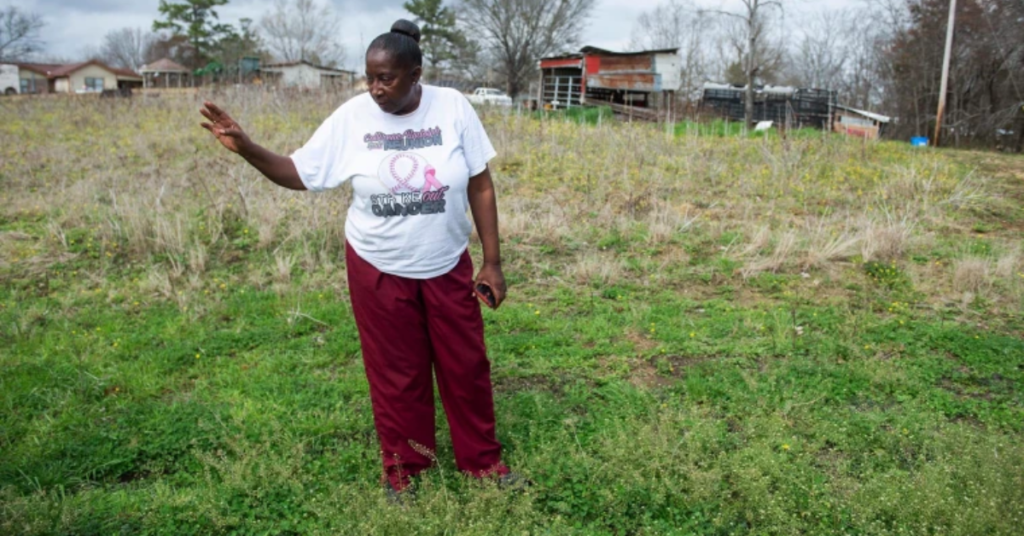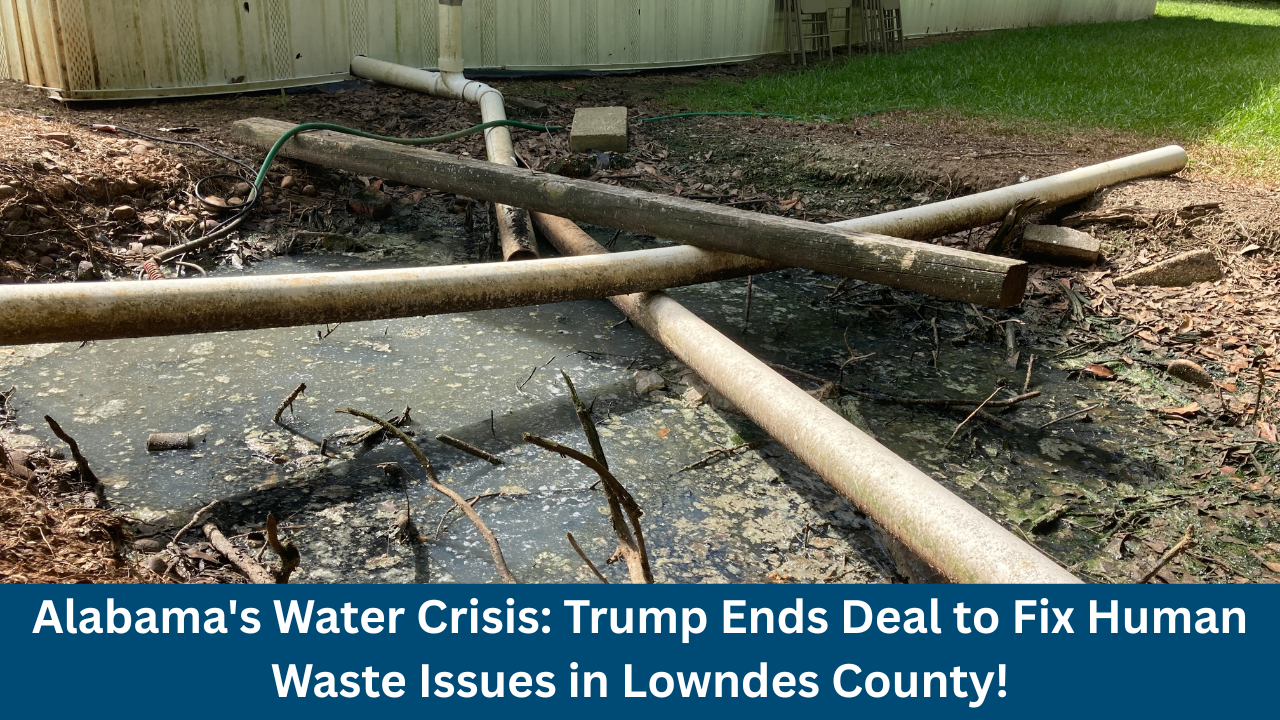In the rural expanse of Lowndes County, Alabama, human waste flowing into homes and yards during rainstorms has become a harsh reality for residents. For the past 14 years, when rain hits, contaminated standing water has flooded Annye Burke’s yard.
Worse yet, when her septic system fails, raw sewage backs up into her toilet. While Burke is understandably frustrated by these unhealthy and inconvenient conditions, she refuses to let it break her spirit. For people like Burke, this issue has become so entrenched in their daily lives that it has simply become “a way of life.”
The ongoing human wastewater crisis in Lowndes County has been so widespread and long-lasting that a 2017 study found that one in every three adults in the county was infected with hookworm, an intestinal parasite.
This is a problem that has persisted for decades, deeply affecting the health and well-being of residents in this majority-Black, low-income community in central Alabama. The situation has been described as “environmental racism,” a term used to highlight how systemic inequities have led to long-term environmental harm for marginalised groups.
In response to this issue, the Biden administration stepped in and investigated the situation. The Department of Justice (DOJ) allocated nearly $26 million to rebuild the region’s water infrastructure, hoping to fix a long-standing problem that has impacted the health of so many. The DOJ’s assessment of the situation pointed to a long-standing deprivation of basic sanitation services for Lowndes County’s residents, most of whom are Black and live in poverty.
However, the situation took a dramatic turn earlier this month when former President Donald Trump issued an executive order to shut down the infrastructure fix. He called it “illegal DEI” and referred to it as an overreach of government intervention under the guise of diversity, equity, and inclusion (DEI) programs. His move came as a direct challenge to the work being done by the federal government to address the water crisis.
The DOJ’s Harmeet K. Dhillon, the assistant attorney general for civil rights under Trump, said that the agency would no longer support “environmental justice” initiatives, particularly those framed through a DEI perspective. According to Dhillon, the focus on environmental justice had been distorted by a DEI lens, which she described as problematic and unnecessary.
This executive order came after a 2023 investigation, led by environmental activist Catherine Coleman Flowers, found that Lowndes County’s low-income residents had been denied basic sanitation for generations.
The investigation uncovered the startling fact that many residents had resorted to using “straight piping” – a dangerous and makeshift solution to dispose of human wastewater. This method involves directing waste from their homes into a network of crude pipes and ditches, which then allows the water to collect in nearby yards, open areas, and woods.

Adding to the problem, Lowndes County’s soil is particularly hard and impermeable, making it difficult and expensive to install proper sewage treatment systems. Residents are left with no choice but to turn to unsafe alternatives. This practice, along with the region’s lack of sewage infrastructure, has led to severe health issues, including the resurgence of hookworm, a condition once thought to be eradicated in the U.S.
As climate change has intensified, rainfall in the region has become heavier, worsening the situation. With increased rainfall, contaminated water has flooded homes, flowed across yards, and polluted nearby vegetation and water sources, exposing families to more significant health risks.
For Burke and more than 300 other families in Lowndes County, this is a daily reality. The county, located about 40 miles southwest of Montgomery, is trapped in a vicious cycle. Their homes lack basic infrastructure, and the sewage crisis continues to threaten their health and their livelihoods.
The recent decision to shut down the initiative to rebuild the water infrastructure in Lowndes County has sparked outrage in many quarters. The predominantly Black community has faced environmental harm for generations, and the federal government’s efforts to intervene were seen as a step toward making things right. The money allocated to the county by the Biden administration was meant to help alleviate the poor living conditions and health risks associated with contaminated water.
However, Trump’s move has not only interrupted those efforts but has also reignited a political debate over the role of government in addressing environmental and social inequalities. While Trump’s administration portrayed the initiative as a “DEI” overreach, critics see it as a denial of basic human rights for the people of Lowndes County. The debate has raised difficult questions about who benefits from such government programs and whether efforts to rectify historical wrongs through environmental justice should be stopped in favour of other priorities.
Residents in Lowndes County are already feeling the lasting impact of Trump’s decision. For decades, these families have endured unsafe living conditions and dealt with preventable health problems. Hookworm, a disease commonly associated with poor sanitation, continues to pose a significant health risk. A 2021 study from the Baylor College of Medicine and the Alabama Centre for Rural Enterprise confirmed that the parasite remains a real problem in the area.

As of now, the residents of Lowndes County face a future where their situation is unlikely to improve without external intervention. The infrastructure problem is not just about fixing septic tanks or sewer lines; it is about addressing long-standing disparities that have left an entire community vulnerable to environmental harm. As the community battles against the prevailing political winds, it is clear that a sustainable solution will require more than just temporary fixes.
The Biden administration’s efforts to allocate funds and fix the water infrastructure were a step in the right direction. For Burke and the many others who have had to live with failing sanitation systems for so long, the end of this project represents a loss of hope. It’s a reminder of how political decisions can drastically impact the lives of people who have already been marginalised for far too long.
As the water crisis in Lowndes County continues, the residents are left to pick up the pieces. Their daily struggles to maintain their homes in the face of raw sewage are far from over. The battle for environmental justice in Alabama is one that won’t be easily won, but for many, it’s a battle that must continue.
The situation in Lowndes County, Alabama, is emblematic of the broader challenges many rural communities across the United States face regarding environmental racism and inadequate infrastructure. While federal intervention was initially viewed as a step forward, political opposition, such as Trump’s executive order, threatens to undo progress. The people of Lowndes County, like Annye Burke, continue to live in crisis, their health and livelihoods hanging in the balance.

Deepak Grover is a dedicated content writer at OTE News, specializing in government affairs, public policy, and current events. With a keen eye for detail and a passion for factual reporting, he ensures readers receive accurate and insightful news. Deepak holds a degree in Political Science and has experience in research-driven journalism.
When not writing, he enjoys reading historical books, exploring hiking trails, and staying updated with global political trends. His commitment to ethical journalism makes him a trusted voice at OTE News.




